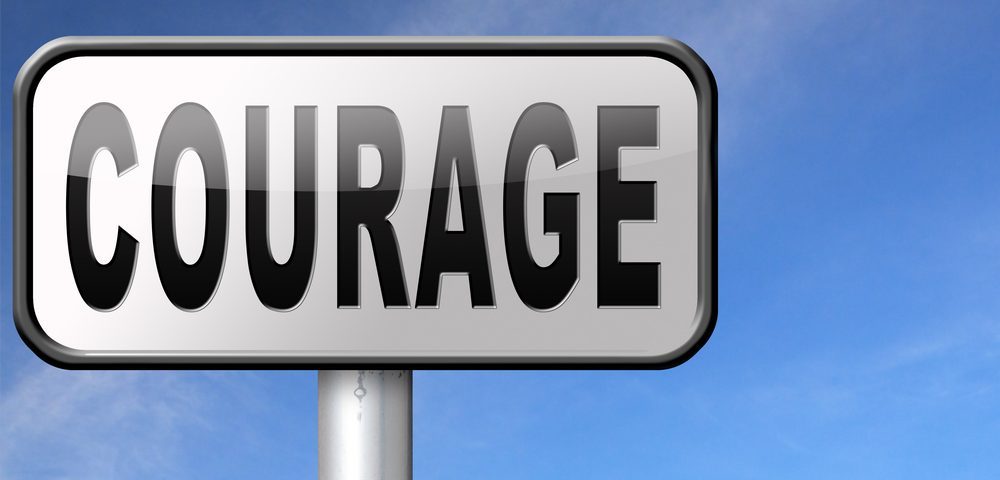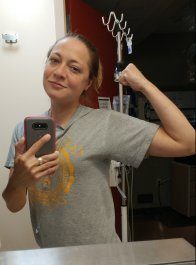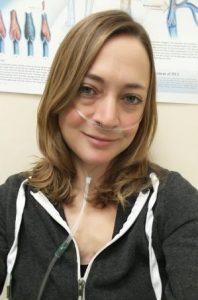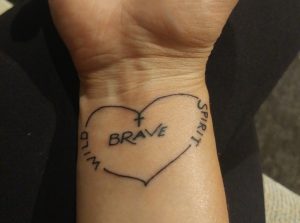I Don’t Always Wear the Badge of Bravery
Written by |

In my previous life (pre-double-lung transplant) I was the bravest I’ve ever been. Before my transplant, the most important piece of my identity was bravery. I was brave in the face of death countless times. Post-transplant, my courage level has shifted into fear, anxiety, and reservation. How do we tap into a vessel of valor after so many traumatic events?
Before transplant, being brave was easy. I never made it a choice. There wasn’t time to be scared when facing acute health decisions; I just did what needed to be done. “Need another PICC-line for IV antibiotics? Here’s my arm.” “Another sinus surgery? Sure, let’s do this.” “Do I want a transplant or do I want to die? Easy, of course I want a life-saving transplant.”
Contrary to popular belief, surgeries, hospitalizations, and doctors’ appointments never get easier. If anything, they get harder. The more times we’re poked, prodded, and sliced open, the more traumatized we are. Each encounter leaves residual trauma. Anxiety before these events is induced by unfortunate negative experiences we’ve had.
I’m having vascular surgery this week. The past several months have been filled with anxious thoughts because of the changes in my body. Needing supplemental oxygen again post-transplant is traumatic in and of itself. What makes it worse is that it isn’t my body’s fault, rather it’s the direct result of medical professionals not listening to my concerns. Also, lack of collaborative work with care teams has been nerve-wracking. It’s challenging to tackle residue from past traumas when they are recurrent.
Rewiring my brain to reduce traumatic responses has been a tough process especially considering the traumatic events aren’t going away any time soon. For my latest medical mystery, it took several doctors to figure out what was wrong with me. The lack of blood flow to my brain mimics feelings of hypoxia, which was difficult to track down. After “firing” two teams, I finally have a group of providers that listen to my concerns, validate my premonitions, and answer all my questions.
The past few weeks have been filled with freakouts. The “what-ifs” have nearly killed me, no pun intended. What if it doesn’t work? What if I’m worse afterward? What if there are complications? I’m both a blood clot and bleed risk, which makes for an interesting combination. I’ve had blood clots a few times, and last Christmas I was hemorrhaging in the emergency room. My face is numb on one side because of the lack of blood flow. “Am I having a stroke? I can’t think straight or function regularly. Is there something wrong with my brain?” The internal dialogue is endless.
What exactly is behind the fear? Exploring the root of our fears is what will propel us forward in releasing the tension. It’s not as simple as being afraid of death. It’s more of a culmination of our past experiences, for better or for worse.
At the moment, I don’t feel brave. I’m scared of a medical professional inflicting unnecessary pain because of a lack of attention to detail. I’m afraid that the strategic plan of what works for my body won’t be followed. I’m fearful of having to deal with repercussions of medical mistakes. All I want to do is run and hide under my blanket fort while watching Disney movies, coloring, and eating snacks. Of course, that’s not an option …
Preparing for battle each time a medical situation arises is how we with CF live our lives. Our mind believes whatever we tell it and our body follows suit. We can’t “choose” to be brave — we just have to be brave. Our feelings will tell us each medical crisis is scary, and believe me, they are.
We’ve conquered so many scary endeavors in our life spans, and we can always rise to the occasion again. Don’t let our fear fool us — we are brave for showing up every day. I’m speaking to myself here, too. We all need these reminders.
The truth is that feelings lie. We have a million feelings every day. If we’re not careful, our temporary feelings will force us into permanent decisions. That’s why bravery is a choice. It doesn’t mean that we don’t feel fear; it means that in spite of fear we choose to be brave. Bravery is allowing tears to flow freely. It means asking for help. And in the words of one of my dad’s favorite actors, John Wayne: “Courage is being scared to death — but saddling up anyway.”
By the time you read this, I’ll be on the other side of this surgery. I don’t know what you’re facing today, but I believe in our shared camaraderie power to be brave, no matter what lies ahead. There’s always hope … for me and you.
***
Note: Cystic Fibrosis News Today is strictly a news and information website about the disease. It does not provide medical advice, diagnosis, or treatment. This content is not intended to be a substitute for professional medical advice, diagnosis, or treatment. Always seek the advice of your physician or other qualified health provider with any questions you may have regarding a medical condition. Never disregard professional medical advice or delay in seeking it because of something you have read on this website. The opinions expressed in this column are not those of Cystic Fibrosis News Today, or its parent company, Bionews Services, and are intended to spark discussion about issues pertaining to cystic fibrosis.










Leave a comment
Fill in the required fields to post. Your email address will not be published.